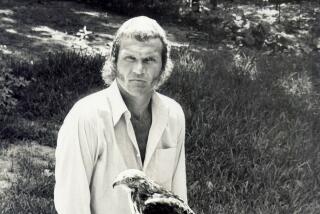A Revealing Encounter With a Bible Belt Town
- Share via
Trouble is the name of a bulldog who lives at a gas station in tiny Listre, N.C. The locals win bets on his ability to predict the weather. If Trouble takes his morning nap indoors, they know, it will rain in the afternoon.
Trouble is also the essence of a stranger who drives into Listre in 1950 in a stolen black Buick Eight, wearing a yellow shirt and a false mustache. His name is Jack Umstead, but in Clyde Edgerton’s seventh novel he is something like the devil, an echo of Mark Twain’s “The Mysterious Stranger” and “The Man That Corrupted Hadleyburg.”
Umstead has “decided some time back that he would more or less live off the land. The one thing he didn’t want to do was pretend to himself that he was a Christian”--and here we hear another echo, of Flannery O’Connor’s God-haunted transgressors. “He didn’t want no part of halfway.”
Listre, to his criminal eye, looks “settled, ripe, timid, kind of stupid.” In short, easy pickings. Umstead sets about gleaning enough information to fabricate a local background. While figuring out where the people who don’t trust banks have stashed their money, he amuses himself by seducing women.
At the gas station, Umstead hears about the famous truck-mule collision that brought Listre a blinking traffic light--like Umstead himself, a symbol of the outer world’s first subtle intrusions. He hears that the Blaine sisters, elderly spinsters who own a nearby store, are terrified of lightning and always close up and leave when it rains. A plan suggests itself. Umstead just has to wait for the next thunderstorm.
Meanwhile, Edgerton (“Raney,” “Walking Across Egypt”) is doing his usual thing, which is to reveal a small Southern Baptist community from the inside out. He uses multiple points of view, often to comic effect. Much of the time we inhabit the innocence of 6-year-old Stephen Toomey. But we also slip into the skins of Stephen’s Uncle Raleigh, an armless World War I veteran and a drunk; and his mother, Alease, who drives the boy to the state prison to see the electric chair and be warned against sin. We hear from 19-year-old Cheryl Daniels, the prettiest girl in town, who falls in love with Umstead; and Preacher Crenshaw, whose lust for Cheryl has plunged him into a spiritual crisis.
Edgerton also sprinkles his narrative with excerpts from “Aunt Margaret’s Bible Stories” and with passages of what might be called random omniscience. Like God, or an alien swooping down from space, he eavesdrops on residents who have nothing to do with the plot, but who somehow contribute to the novel’s flavor.
What makes “Where Trouble Sleeps” different from other novels is Edgerton’s gentle touch with potentially explosive material. He shows us a society whose blind spots are obvious--this is, after all, the South in the Jim Crow era--but whose Christianity is vital and sincere. Separating the faith’s “good” and “bad” parts, he demonstrates, is no easier than imagining a character whose vices aren’t, in some sense, a function of his virtues.
Edgerton’s compassion extends even to Umstead, the villain. He is charming and intelligent enough to find prosperity and love in all sorts of lawful ways, if what he vaguely calls “mental and nerve problems” didn’t prevent him. He can see other people only as prey, and so can’t accept or even comprehend what they want to give him freely; he can only steal. This is damnation, as sure as it gets.
More to Read
Sign up for our Book Club newsletter
Get the latest news, events and more from the Los Angeles Times Book Club, and help us get L.A. reading and talking.
You may occasionally receive promotional content from the Los Angeles Times.










